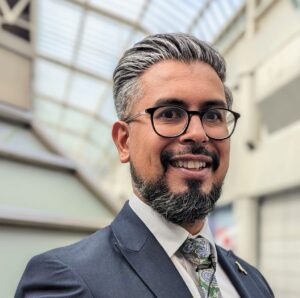Male allyship. Two rather innocuous words, however two words when used in the context of tackling the issues around male violence against women and girls (MVAWG), misogyny, and sexism that I have found tend to provoke a sharp defensive reaction in many men.
And yet, from my experience from the best part of a decade in the police accountability framework, at the Independent Office for Police Conduct, male allyship can have a huge role to play in tackling these issues within policing in this country.
25th November is the start of the United Nations International Day for the Elimination of Violence Against Women. This marks the launch of 16 days of activism to highlight what women face globally.
My personal journey in becoming a male ally started a few years ago. As the former Director for London at the Independent Office for Police Conduct, I had a unique lens on some of the worst forms of police misconduct. Time and time again, I used to see women who were victims of men. Whether that was in the most tragic cases such as Sarah Everard who was murdered by then serving Metropolitan Police Officer Wayne Couzens, to the more ‘casual’ misogyny which was laid bare in the unwitting audit trails of WhatsApp messages left by serving male police officers. In Operation Hotton, a series of nine independent IOPC investigations, my team uncovered a culture of bullying and harassment by serving Metropolitan Police officers against other serving officers, predominantly women. The WhatsApp exchanges of these officers exposed all forms of deep-seated bigotry, but notably misogyny. We found a culture which normalised this behaviour as ‘banter’ and diminished any attempts made at addressing this. I made the decision to publish these exchanges unredacted to expose this toxic culture, not just to members of the public but also other serving officers- otherwise, how would they ever know?
Below is just one example of such an exchange:
“Getting a woman in to bed is like spreading butter. It can be done with a bit of effort using a credit card, but it’s quicker and easier just to use a knife.”
I found it particularly striking that some even more offensive exchanges on WhatsApp were often made in large groups of other serving officers, and no one challenged them.
But why didn’t they?
It was a question that troubled me, even during the media maelstrom that ensued after the publication of our Operation Hotton report. In a role where police officers being there for each other in sometimes the most dangerous, even life threatening situations is imperative, why did this intrinsic principle disappear when it came to internal police culture and when female colleagues where in need?
When a culture is all pervasive it can be difficult. One reason people don’t speak up is the cost of doing so. Challenging the status quo can threaten people’s status and relationships with their colleagues as research shows. Speaking up can also harm careers with negative performance evaluation, undesirable job assignments, or even termination of employment. Then there is the bystander effect: when a person is in trouble, others who are present often fail to intervene, because they assume other people will or because they think it’s not their place to act. The more costly intervening is, the less likely we are to do so.
HMICFRS looked more deeply into this issue of misogyny in police culture in their inspection of vetting, misconduct, and misogyny in the police service in November 2022. They discovered a troubling picture :
“…a culture where misogyny, sexism and predatory behaviour towards female police officers and staff and members of the public still exists.”
Sadly, the inspection report is littered with examples of the predatory behaviour and ingrained sexism and misogyny of male officers – the stark reality of what it is like to be a woman currently serving in the police service.
In this period, I had been introspecting on what I was like in my understanding of the issues women have to face. I thought I was ok, but actually I came up short in my understanding. So, I started to speak to the women in my life to try and better understand the daily sexism they face, the daily adjustments they make in their lives because of men. There were too many to count. I felt a deep shame that as a husband, father, and colleague I had been oblivious to so much.
It was following the publication of Operation Hotton that I started to speak in a professional capacity about the need for male allyship in policing and continue to do so to this day. Male allyship involves men actively supporting and advocating for women’s rights, equality, and inclusion and plays a crucial role in dismantling gender discrimination. Where women are the victims it can’t be incumbent on them to lead the change needed to police culture; it’s men that need to change.
The value of engaging men as allies can be evidenced. Where men are deliberately engaged in gender inclusion programmes, 96 per cent of organisations see progress, compared to only 30 per cent of organisations where men are not engaged.
At a time where more than half of women don’t trust the police to keep them safe, policing must look first to securing the trust and confidence of its own female officers and staff.
It shouldn’t have to happen to you for it to matter to you.
All men in policing need to embrace this challenge when it comes to the fight against MVAWG, misogyny and sexism.
To be the best that it can be, policing needs more male allies.
